February 4, 2011
ghc-ansi-terminal, ANSI terminal support for Haskell is now available for Fedora. It allows cursor movement, clearing the screen, coloured output, showing or hiding the cursor, and setting the title.
$ sudo yum install ghc-ansi-terminal ghc-ansi-terminal-devel
An example code, ansi.hs is given below:
import System.Console.ANSI
main = do
setCursorPosition 5 0
setTitle "ANSI Terminal Short Example"
setSGR [ SetConsoleIntensity BoldIntensity
, SetColor Foreground Vivid Red
]
putStr "Hello"
setSGR [ SetConsoleIntensity NormalIntensity
, SetColor Foreground Vivid White
, SetColor Background Dull Blue
]
putStrLn "World!"
A screenshot of the output when the above code is executed:
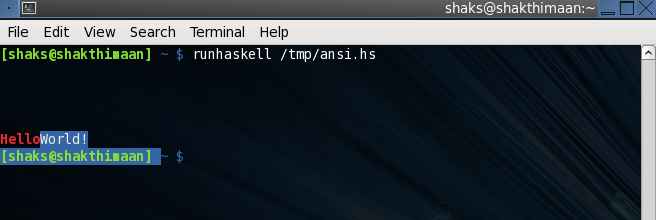
November 18, 2010
flterm, a serial terminal and firmware download program, part of the Milkymist VJ SoC is now available on Fedora.
$ sudo yum install flterm
You can run it using:
~~~~ {.shell} $ flterm Serial boot program for the Milkymist VJ SoC - v. 1.1 Copyright (C) 2007, 2008, 2009 Sebastien Bourdeauducq
This program is free software: you can redistribute it and/or modify it under the terms of the GNU General Public License as published by the Free Software Foundation, version 3 of the License.
Usage: flterm –port
[–double-rate] –kernel [–kernel-adr
] [–cmdline [–cmdline-adr
]] [–initrd [–initrd-adr
]]
Default load addresses: kernel: 0x40000000 cmdline: 0x41000000 initrd: 0x41002000 ~~~~
November 9, 2010
Visited Lavasa, Pune, Maharashtra, India for the Deepavali weekend. More photos are available at my /gallery.



October 11, 2010
I had visited Sreenidhi International School, Aziznagar, Moinabad, Andhra Pradesh, India to help them with the KMR Foundation’s OLPC project. They will soon start using an instance of WordPress for their blogs, where you can get to know updates on their OLPC deployment. They already have a blog for their Primary Years Programme (PYP). I helped them with few software, hardware problems that they were facing with their OLPCs (XO-1).
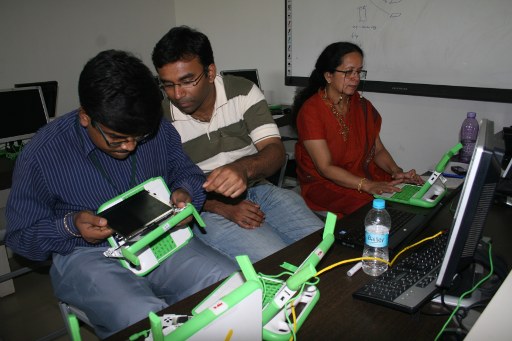
October 5, 2010
I had scheduled to conduct a one-day Fedora, Free Software workshop at Mepco Schlenk Engineering College, Sivaskasi, Tamil Nadu, India on Saturday, October 2, 2010, but due to the Ayodhya verdict, I had to cancel it in the last moment.
I then tried to get Internet Relay Chat (IRC) up and running on their college computer labs that were running Fedora. They were using squid proxy, and I had requested the system administrator to configure it to allow IRC connections. He got it working, and we decided to go ahead with online IRC training for the following sessions:
The IRC log of the session is available. They were kind enough to take some pictures during the sessions and send it across to me.

Thanks to Prof. Shenbagaraj for working with me for the past two months in organizing this workshop. Hopefully, someday, I will meet them in person.
September 22, 2010
Attended OSI Tech Days, September 19-21, 2010, Chennai to listen to Prof. Eben Moglens’ talk on Freedom and the Web: Equality in the 21st Century. I also manned the ILUGC stall for some time. It was good to catch up with lot of old-timers.
Later in the evening, I was asked to join the panel discussion on “Building a FOSS Ecosystem in India; the role of different players”, and had a chance to meet Dr. M. Sasikumar (Director, CDAC, Mumbai), Prof. G. Sivakumar (IIT, Mumbai), V S Raghunathan (Technical Director, National Informatics Centre, Tamil Nadu State Centre, Chennai), Prof. C N Krishnan et. al. A picture of the panel discussion:
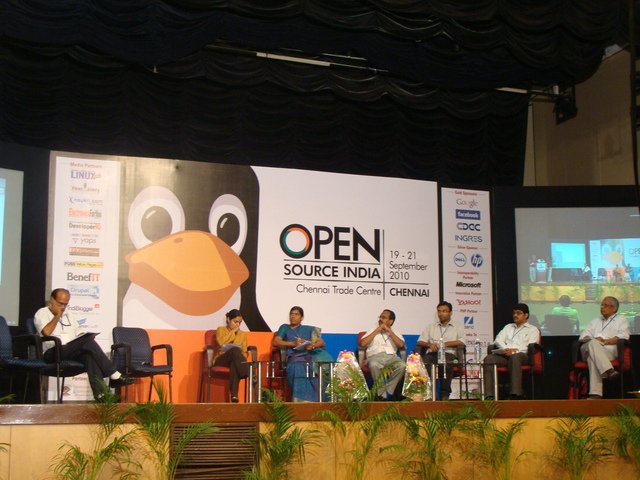
September 22, 2010
Attended Software Freedom Day, 2010, at Chennai, on Saturday, September 18, 2010 at Birla Planetarium, organized by ILUGC. Photos, courtesy of T. Shrinivasan. Two important observations:
- The number of colleges/universities that participated in the Free/Open Source Software (F/OSS) stalls has increased.
- F/OSS awareness programmes are essential, and have their own signficance.
September 6, 2010
Type-level programming library is now available on Fedora testing repository. Type-level functions are implemented using functional dependencies of multi parameter type classes. A tutorial on type-level numerals and their usage to implement numerically-parameterized vectors is available at http://www.ict.kth.se/forsyde/files/tutorial/tutorial.html#FSVec. You can install it on Fedora using:
~~~~ {.shell} $ sudo yum –enablerepo=updates-testing update ghc-type-level ~~~~
August 30, 2010
A hands-on workshop on Clojure was organized in TwinCLinGs’ August months’ meet at Rhythm & Hues Studios Pvt. Ltd, Hitech City, Hyderabad, India by Bhaishampayan Ghose, co-founder and chief geek at Infinitely Beta. A picture of the attendees:
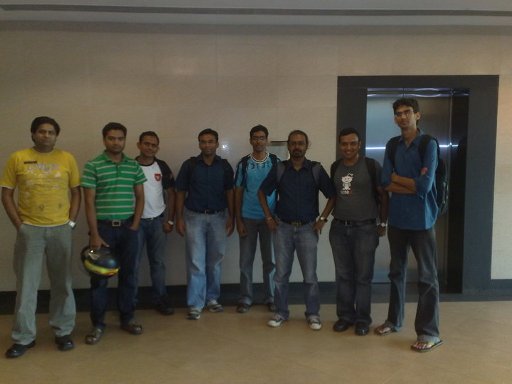
The slides are available. You can install clojure on Fedora using:
$ sudo yum install clojure
A clojure programming book is also available at http://en.wikibooks.org/wiki/Clojure to get started! Thanks to volunteers who sponsored for Bhaishampayan Ghoses’ travel, to and from Pune, India.
August 22, 2010
Visited KMRF who needed assistance in installation, troubleshooting, and use of the XO laptops. I had a chance to visit the Government school in Aziznagar, Ranga Reddy district, Andhra Pradesh, India, where they have their XO laptop deployment. Most of the students can speak only in Telugu. They have a chart in the classroom for English-Telugu reference.
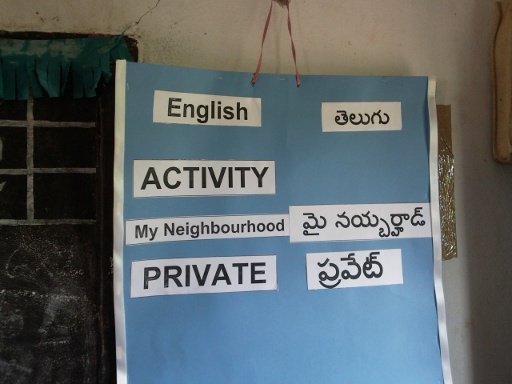 .
.
Tuxmath was installed, and they enjoy using it a lot:
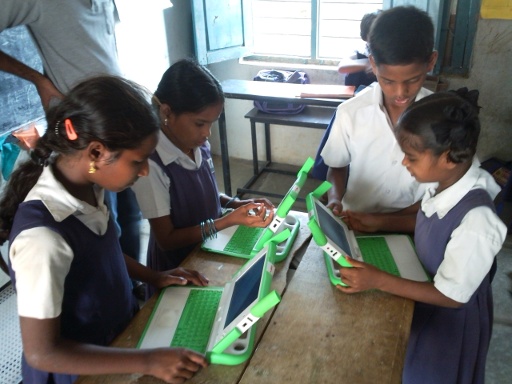







 .
.